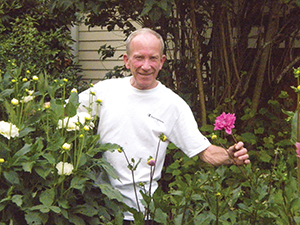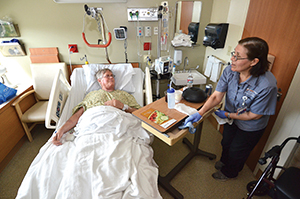By ELLEN FUTTERMAN
Compassion — the desire to alleviate the suffering of another — is the foundation of Catholic health care. And as reduced resources, changing reimbursement strategies and high-stress job demands take their toll on health care providers, it's becoming clear that patients aren't the only ones who benefit from compassion. Stressed care providers could do with a little TLC too.
"Compassion is really the foundation of clinical practice and the critical element for healing in health care," says Becca Hawkins, who along with Dr. Mark Rosenberg, co-direct Compassion Strategic Initiatives for Providence Health & Services, based in Renton, Wash. Rosenberg and Hawkins will lead an Innovation Forum at the Catholic Health Assembly next month entitled "Building a Compassionate Health Care System: One Compassion Infusion at a Time." The assembly is June 7 – 9 in Washington, D.C.
Providence employs more than 76,000 caregivers and operates 34 hospitals, 475 physician clinics, 22 long-term care facilities and 19 hospice and home health programs across five Western states.
"You can't have a culture of safety without compassion," Hawkins says. "Patient satisfaction, quality and cost effectiveness are what every health care organization today aims for. We view compassion as the energizing force that enables all of that."
Hawkins says compassion is "part of our mission, vision and values and should ideally be lived out in the authentic heart of each person who works in our health care system." Unfortunately, she adds, compassion can get blocked because of certain barriers and stresses.
Nurturing caregivers
In 2012, a national survey in the Archives of Internal Medicine found physician burnout in the United States to be at 46 percent. According to various studies, at least one-third of nurses who work in high-risk settings may be suffering from burnout at any given time.
"If we want to change the way our health care system delivers care to patients we have to pay attention to how our caregivers are treated within our systems," says Rosenberg, who is an internist. "How can we allow our employees as individuals, as teams, and as a system to reconnect to their sense of service and compassion that brought them to health care in the first place?"
Rosenberg and Hawkins say strengthening compassion must come "organically" from the "bottom up" rather than as an initiative from management. To facilitate the process, they have created "infusions" to help build resilience and create capacity to increase compassion.

Patrick Helling and colleagues at Providence Portland Medical Center cut flowers from their gardens for patient bouquets.
Doctors meet housekeepers
One of the infusions, "Connecting conversations," for example, brings together two very different groups of people at Providence Portland Medical Center in Portland, Ore., such as housekeepers and doctors, for a series of guided conversations. By asking each other about their jobs, the hope is to build unity and understanding of the other person's impact on patients and families.
"These groups talked about how meaningful it was to have care of the patients in their hands," says Rosenberg. "What was inspiring was that the doctors realized the housekeepers spent more time with the patients than they did. The housekeepers connected in a much more personal way and were a critical part of the care experience."
Rosenberg said through talking with one another, doctors and housekeepers realized they are working as part of the same team, with the same goal, to take care of patients. The doctors talked about the hard things in medicine, like when a patient dies. The housekeepers, in turn, talked about what it was like to show up at a room they had been cleaning for days only to find the patient gone.
"They are not really allowed to ask what happened," says Rosenberg. "They don't get to know if the patient died, or went home, or was transferred. When you don't have closure with a patient you get close to you carry a lot of suffering."
Rosenberg noted that each group was encouraged to relay the conversations to co-workers. "The upshot is that all the doctors, not just those in the group, now relate to all the housekeepers in a different, more positive way and vice-versa," he says.
Homegrown bouquets
Another ongoing compassion infusion effort brings together hospital employees recognized as employees of the month in 2013. They meet monthly in a "compassion affinity group." "We were charged with brainstorming ideas to perpetuate compassion between patients and employees, and employees and employees," explains Patrick Helling, a member of the group and manager of two cafés at Providence Portland Medical Center.
"Since I have a passion for growing dahlias, I thought we could recruit other employees who like to grow flowers and organize a way to give them to patients. Everyone seemed to like the idea so we embraced it."
The compassion affinity group worked with various departments to execute the effort. This included publicizing it, gathering the donated flowers and vases, assembling the bouquets and getting them to patients.

Housekeeper Maria Tovar chats with Gene Platt as she cleans his room at Providence Portland Medical Center in Portland, Ore. Housekeepers can spend more time with patients than physicians do, and may connect with patients in a personal way.
Helling and other food service employees, who typically don't have much direct contact with patients, volunteered to be trained and deliver them. From July through November 2014, this group of 200 delivered more than 650 "compassion bouquets."
Kindness loop
Feedback from patients and their families has been overwhelmingly positive. "One patient going through cancer treatment, who is in remission now, has come by the café several times to visit," he says. "She was just so touched by the flowers and how they cheered her up."
Helling hopes more employees will volunteer to participate when the bouquet delivery starts again in July. "We have a lot of Providence employees who work behind the scenes and never experience being a caregiver to a patient. If they get involved I know it will be beneficial to them and to patients," he says.
The affinity group also enlisted the hospital's leadership to deliver coffee and fruit to employees on various units on nights and weekends as a way of saying "thank you" for working hard shifts.
Just breathe
Other compassion strategies being tested include mindfulness training, in which employees learn to live in the moment; sharing gratitude among employees through daily emails; and regrouping as a team, taking a minute to collectively breathe, after working through an emergency code.
After a year, Hawkins and Rosenberg say there is no one right way to promote compassion. "Some things will be locally grown such as the affinity group, some will be more systematic like doing compassion strategic planning with different regions so that people have a structure and support to 'do it their own way,'" says Hawkins. "We have been amazed at the support and enthusiasm for compassion-related activities. People seek them out and view them as a gift rather than an added responsibility."
Looking ahead, Hawkins and Rosenberg hope that Providence employees come to see compassion as not what they do, but as who they are.
"For us, success would be when people say, 'I want to work or be a patient at Providence because they have something really different,'" says Rosenberg. "You can't exactly explain it, but you know it because when you walk into one of our facilities it feels like you are the most important person to them today."
Copyright © 2015 by the Catholic Health Association
of the United States
For reprint permission, contact Betty Crosby or call (314) 253-3477.